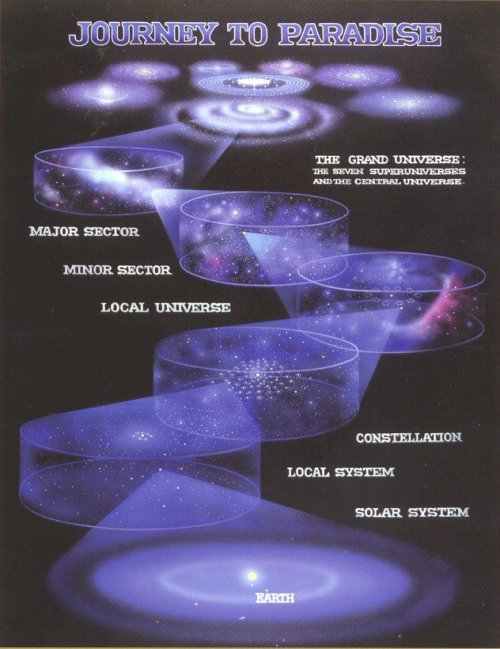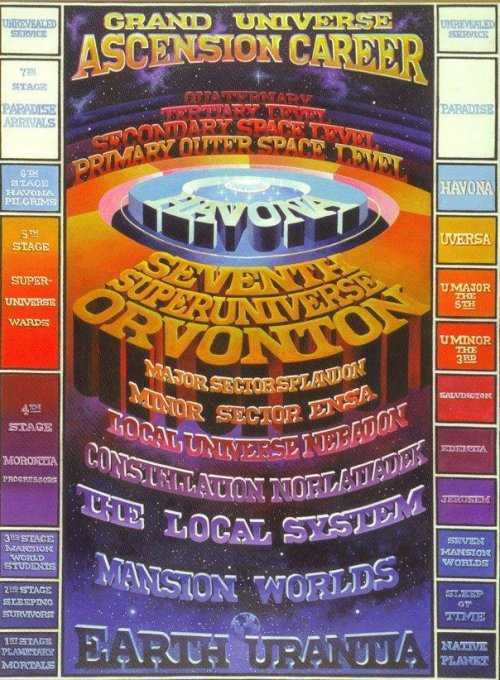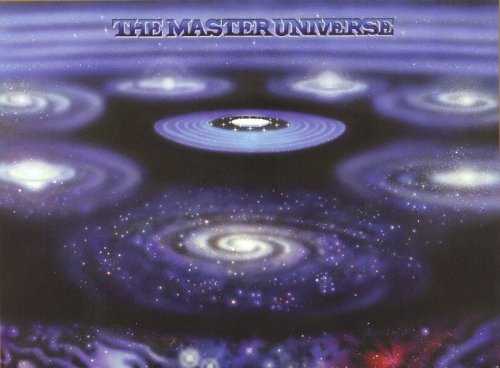What is it?
The Urantia Book contains nearly 2,000 pages divided into 196 Papers related to all aspects of human life.
The book begins with a description of God and the central universe of divine perfection. Its description of the cosmos moves outward toward life on our planet, covering in the process the essential elements of our careers from life here on Urantia (the universe name for the earth), all the way until we come into the personal presence of God on Paradise, and beyond.
The six hundred fifty page account of Jesus' life places the Urantia Book in a class with the finest literature in the English language.
What does it say?
Some concepts in the Urantia Book have never before been expressed in print. The book's unique value consists in the comprehensive manner in which already well-known concepts are presented so as to illuminate God's love for each of us, and our place in his eternal plan--fitting these concepts together so as to give a philosophical and spiritual unity to our understanding of God's dealings with mankind. Some important themes are:
God; The Universal Father is the eternal creator, controller, and infinite upholder of all reality, the source and destiny of all personalities, and the head of all government throughout the universal realms. Except for God, there would be no such thing as reality; without the Father would not anything exist that does exist. The Father is living love, a Person who knows us, and whom we can know. The Father dwells within us, and in him we live and move and have our being.
The universes; The galaxies are sprinkled with inhabited planets, many harboring civilizations billions of years old. The perfect central universe and the evolutionary universes such as our own all circle Paradise, the dwelling place of the eternal God at the center of all things.
Unending progress; God has a purpose for every world in his almost limitless domains, and a plan for every creature on every one of them, a plan which embodies unlimited progress in eternal growth. Mortals start at the bottom and, through faith and service over long periods of time, ascend through the universes until one day we come to be with God on Paradise. In future ages he will send us forth to serve in new universes now in the making.

Eternal life; God has a far-reaching plan for us which embodies boundless attainment, adventurous service, and personal fulfillment. Nevertheless, it is wholly optional whether or not we accept this plan. The Father has endowed each of us with the free will to accept or reject all or any part of his plan. The heavenly Father has ordained that we be free persons, and he respects the choices we make, even when such choosing is self-destructive. As a place, hell does not exist; after death, those who reject the way of life simply cease to exist. God loves every one of his children, and wants each of us to survive, but nonetheless he endows us with the prerogative to chart our own courses.
The inner light; The Universal Father gives each of us a fragment of his spirit to indwell our mind, and lead us toward him into eternal life. When a person's life purpose becomes wholly pure, when his or her faith is perfected, he or she will spiritually fuse with this indwelling spark of divinity and become everlastingly at-one with God. Such fusion normally occurs after this life in the flesh, and is but the first stage of a never-ending revelation of the infinity of God to the one-time mortal.
Faith; It is our personal faith in the promises of god that ensures our becoming partakers of the divine nature. We must be willing to give God all that we have and are; our commitment must be unreserved, no aspect of our lives held back. Faith is the price of eternal life.
Righteousness; Those who claim to love God, yet refuse to live by high moral and ethical standards, deceive themselves. A life of integrity inevitably results from an inner life consecrated to God. We are not saved because we are righteous, rather, we live in harmony with divine values because we love God and desire to do his will.
Spiritual transformation; The old way to find God required man to suppress, obey, and conform to rules of living. In the new way we are first transformed by the Spirit of Truth, and thereby strengthened in our inner souls by the constant spiritual renewing of our minds, and so are endowed with the power of the certain and joyous performance of the gracious, acceptable, and perfect will of God.

God's universal family; We are all part of a gigantic enterprise involving uncounted trillions of beings whom God is perfecting on uncountable worlds. We are all brothers and sisters in God's universal family, and thus are affected by every other family member's actions. Any person's good effort moves the family forward, while any person's failure to choose the way of light retards us all.
Service; A life of dedicated service to our fellows inevitably results from spiritual commitment. We can be God's partners in helping make this earth into the place he intends it to be, and help bring health, sanity, and happiness to mankind. Apart from serving others, life is meaningless and unfulfilling.
Jesus of Nazareth; The Urantia Book's section on Jesus' life and teachings fills more than a third of its pages, and may be the book's most powerful contribution. It portrays Jesus as a divine Son of God, the creator of the vast stretch of the universe in which we live. There are other divine Sons of God who bear a similar relationship to God the Father in other parts of the grand universe. To us, however, the Son of God who incarnated on earth as Jesus of Nazareth is, to all intents and purposes, God. He came to earth to experience life as we live it on earth that he might become a more merciful and understanding sovereign, and while here, reveal God's love to his earthly children.
Criteria of Truth
It matters what is true. It is important that we live fulfilled, productive lives on earth, and we cannot do so without acting in consonance with reality. The Urantia Book claims to be true--claims to describe reality as it actually is. In conjunction with the Father's indwelling spirit, the Urantia Book is intended to serve as a cosmic compass to help guide us safely through this life's perplexities and into life everlasting. However, it isn't necessary to believe the Urantia Book is true in order to profit from reading its pages.
Think of the olden philosophers: Plato, Aristotle, St. Augustine, St. Thomas Acquinas, Spinoza, Locke, Kant, William James, Hobbes, Descartes--each was vitally concerned with what truth is, and how man could know it. The following is this author's analysis of the Urantia Book's validity with respect to their traditional criteria of truth, as well as a few new ones:
1. Correspondence to reality. If the Urantia Book were true, the personal appropriation of the ideals it expresses should improve the quality of my life and my interpersonal relationships. I have found this to be the case. I am inclined to believe its teachings because they are associated with so much that I can verify in my own personal experience.
2. Self-consistency. A house divided against itself falls. The thousands of details discussed in the Urantia Book's eighteen hundred pages from various perspectives agree remarkably. It's impossible for me to account for such consistency apart from the Urantia Book being the revelation it claims to be.
3. Inner validation. The Urantia Book teaches that the indwelling spirit is the standard of truth for each of us. Our own spirits will respond to truth. We do not have to depend on what others tell us, because God has given each of us an inner witness. I had such a strong inner response in reading the Urantia Book, as have thousands of others.
4. Glorification of God. Jesus said that the person who seeks his own glory speaks for himself, but the one who seeks God's glory speaks the words of the Father. The entire Urantia Book exalts God as our Creator, Father, and Friend.
5. Believability of the account of Jesus' life. Since none of us were then alive, it's not possible to say from personal experience whether Jesus' life transpired as the Urantia Book--or the Bible for that matter--says it did. Nevertheless, the book's extremely detailed account of Jesus' life imparts such a vivid conviction of spiritual reality as to lead most readers to conclude that Jesus at least must have been like the person described in the Urantia Book. I found no way to account for the story apart from it being what it says it is. If it isn't what it say it is, what is it?
6. Tolerance and openness. The Urantia Book makes no claim to be The Whole Truth. Some religious groups attempt to set their adherents apart to keep them uncontaminated by alien concepts of other faiths. To the contrary, the Urantia Book encourages its readers to study every world religion, to seek for, appreciate, and embrace truth wherever it might be found. The Urantia Book exhibits this attitude of appreciative openness even while setting forth its own views in categorical terms.
7. Quality of thought. The concepts found in the Urantia Book, and their mode of expression, have no peer in the spiritual literature of mankind. The overall character of the Urantia Book manifests inherent excellence of thought expressed clearly and distinctively. It does not compromise its message in order to make its teachings less demanding and thus hypothetically more acceptable. The entire book is suffused with spiritual flavor, predicated on faith in God and the injunction that we should dedicate our lives to serving others.
8. Absence of unworthy motives. There are several independent non-profit membership organizations of Urantia Book readers. I am unaware of any with bad motives, or which seek money, fame, power, or personal aggrandizement of any kind. The only gain for these membership groups is that you enjoy a more fulfilling relationship with God.
9. Test of time. All of us go through periods of intense fascination with something that seems to improve our lives, only to move on to something new after more extensive contact exposes latent shortcomings in our former object of interest. In contrast, only rarely do readers of the Urantia Book cease to be readers. The book's teachings about faith in God and service to man never become outdated.
10. Witness of others. Perhaps you know others for whom reading the Urantia Book has been a life-changing experience. If not, this article is my testimony. But don't leave it at hearsay, find out for yourself.
11. Results of reading. The tree can be judged by its fruit; truth can be acted out. The Urantia Book can be successfully applied to reality. The teachings of the Urantia Book, put into practice, bring us closer to God. The book imparts spiritual assurance in our increased knowledge of God's love and upholding, and our sure place in the Father's affection. Thousands who have read its pages have found thereby greater meaning in their lives.
Relationship to the Bible
The Urantia Book is not based on the Bible, but is consistent with its spiritual teachings. With respect to Jesus' life, the Urantia Book contains vastly more detail. Scholars estimate that the entire New Testament describes only 29 separate days of Jesus' life, whereas the Urantia Book's account fills 689 large pages with the day-to-day story of the Son of God who lived on earth for almost 36 years as the son of man.
The Urantia Book and the Bible wholly agree in upholding the spiritual realities of hope, faith, love, grace, eternal life, and all other significant spiritual teachings. However, I would like to mention three doctrines where the Urantia Book is completely at variance with certain common interpretations of the Bible, namely, scriptural infallibility, original sin, and the atonement doctrine.
With respect to the doctrine of scriptural inerrancy, the Urantia Book teaches that all things which pass through the minds and hands of men become to a greater or lesser extent human, and that no book, the Urantia Book included, contains The Final Truth. Revelations of truth like the Bible and the Urantia Book proceed from God, but no revelation short of attaining the Father himself could ever be complete. Moreover, God did not stop revealing himself to his earthly children in the first century AD. We should honor the sacred writings of every religion, but not blunder into the quasi-idolatry of making them virtual objects of worship, something God never intended them to be. God is the source of truth, not ink on paper, whether in the form of the Bible, the Urantia Book, or any other writing. A book can be a faithful representation of higher reality, but it isn't the reality itself--otherwise it wouldn't be a book. The road map isn't the highway.
The Urantia Book rejects the doctrines of original sin and the atonement as misrepresenting the heavenly Father's love. These associated doctrines hold that as a result of Adam's sin, all mankind became cursed with hereditary guilt. Even newborn babies were 'children of the devil.' God wanted to forgive man, but could not do so until someone wholly innocent paid the price for Adam's sin. God's justice required blood to be shed before he could forgive sin and ransom mankind from the supposed clutches of the devil. Therefore, God arranged for Jesus to be sacrificed on the cross so that he could receive mankind back into his love and grace.
The Urantia Book, to the contrary, states that evil men, not God, crucified Jesus. It teaches that God has always loved his children on earth, and that nothing can separate an individual from God except for his own personal sinfulness--not anyone else's. Jesus died for mankind just as he lived for us, but God did not require that Jesus die on the cross. Jesus did not need to move his heavenly Father's divine heart to love and forgive his earthly children--the Father has always loved us.
Is this connected with a cult?

The term 'cult' pejoratively describes a non-mainstream religious group which is seen to have unusual and exclusive religious practices and which maintains itself separate from the larger community's common goals and practices. The cult's devotees blindly follow a charismatic and opportunistic authority figure who, sooner or later, induces them to give him all their worldly belongings. An apocalyptic event is usually just over the horizon, adding urgency to the leader's directives.
Sometimes such cults are also 'occult,' meaning that their teachings are mystic and secret. Like the Gnostics of the early Christian era, practitioners of the occult believe that they progress in spiritual status as hidden knowledge is revealed to them.
The Urantia Book would not be a useful cult object, since its teachings are unalterably opposed to the worship of any person or thing other than God, and due to its emphasis on each of us following the leading of God's spirit for our spiritual guidance as opposed to that of human beings. I have never met a reader who treats the Urantia Book as a cult object. Readers honor the book for the truth it contains, but also seek for truth wherever else it may be found.
There is no authority figure except God as he reveals himself to each of us. There exists no organization of Urantia Book readers remotely comparable to even a mainstream Christian denomination, much less to a cult. Readers so inclined, such as myself, remain active in their respective churches or synagogues. Furthermore, the book has nothing in common with the occult. There are no mystical teachings, and no initiates. The Urantia Book teaches that we are not saved by what we know, but by Who we know, the loving Father of all mankind.
